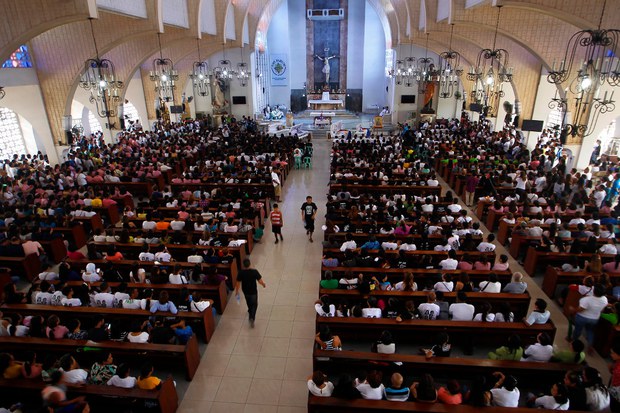Politician Jailed on Drug Charges Dies in Custody in Philippines
2020.09.04
Cagayan de Oro and Cotabato, Philippines
 Hundreds of supporters attend the funeral mass in Ozamiz, Philippines, for city mayor Reynaldo Parojinog, who was killed with his wife, a brother and several others following a police counter-narcotics raid at their home, August 2017.
Hundreds of supporters attend the funeral mass in Ozamiz, Philippines, for city mayor Reynaldo Parojinog, who was killed with his wife, a brother and several others following a police counter-narcotics raid at their home, August 2017.
Philippine police said they were investigating the in-custody death on Friday of a politician who was on a list of some 150 mayors and other officials named by President Rodrigo Duterte for alleged ties to the illegal drug trade.
Ricardo Parojinog, a former local councilor, was found dead in his cell at the jail in Ozamis city, in southern Misamis Occidental province, of apparent natural causes.
Still, national police chief Gen. Camilo Cascolan said, he ordered the regional police to place “all night-shift duty personnel under restrictive custody to be available for investigation.”
The police in charge of the jail, led by Lt. Col. Jiger Noceda, were being investigated “to determine their liabilities,” Cascolan said.
Parojinog, who was alone in his jail cell, was found dead around 6 a.m., national police spokesman Brig. Gen. Bernard Banac said, adding there were no signs of foul play.
“There was no violence – no gunshot or anything,” Banac said. “He was just discovered dead by our police. The security was very tight because he is a high-risk inmate.”
Parojinog was in jail on drug charges, and was scheduled to appear in a city court on Friday. Jail custodians said they found him dead when they went to his cell to prepare him for court.
“One of his escorts was waking him up in his cell but he was already unresponsive,” Banac told reporters. “Upon discovery, the police on duty immediately called for a medical team to attend to him.”
Influential political family
Parojinog belonged to an influential political family in the southern Mindanao region. His brother, Reynaldo Parojinog, was mayor of Ozamis when he was killed by police during a counter-narcotics raid at his house in July 2017, along with his wife Susan, another brother, Octavio, and a dozen other bodyguards.
Reynaldo Parojinog’s daughter was arrested following the raid and is currently in jail on drug trafficking charges.
Parojinog, who wasn’t in the house at the time of the police raid, escaped. He was arrested and deported a year later from Taiwan.
In October last year, David Navarro, the mayor of Clarin town in Misamis Occidental, who was a known associate of Reynaldo Parojinog, was arrested by police on allegations that he beat up a massage therapist in Cebu. Duterte has connected him to the drug trade. A day later he was gunned down along with two police escorts, when they were ambushed, regional police said.
Several other politicians, including mayors, have met a similar end to Navarro’s since Duterte came to power in 2016 and launched his much-maligned “war on drugs.”
Rolando Espinosa Sr., the mayor of central Albuera town, was killed while in police custody in November 2016. He allegedly had links to the drug trade. Police said he pulled a weapon on officers who were conducting a search of his jail cell, which triggered a shootout and resulted in his death.
A month before that, Samsudin Dimaukom, the mayor of Datu Saudi-Ampatuan, was gunned down by police officers near the southern region of Maguindanao after he allegedly rammed through a checkpoint and fired at them. Dimaukom was on Duterte’s list of officials with alleged drug links.
In 2018, Tanauan City Mayor Antonio Halili, who was allegedly involved in the drug trade, was shot and killed by a sniper at a flag-raising ceremony.
Bloody war on drugs
Duterte, 74, was elected president on a campaign pledge to eradicate drugs in the Philippines.
The police say that nearly 6,000 suspected drug addicts and pushers have been killed in the president’s anti-drugs campaign. Rights groups say that the figure could be four times higher.
International human rights groups and the United Nations have criticized the brutality of Duterte’s drug war, but government officials have defended it as necessary for law and order in the country.
Duterte faces two separate murder cases in the International Criminal Court linked to thousands of deaths in his drug war. In response, he withdrew the Philippines from an international treaty that created the court.
Still, Duterte is continuing his campaign undeterred.
On Monday, he instructed his customs chief to shoot dead anyone caught smuggling narcotics – just days after dozens of human rights groups urged the United Nations to investigate the killing of thousands of drug suspects in the Philippines since 2016.
During a televised meeting with his cabinet late Monday, the president said he met with Rey Leonardo Guerrero, commissioner of the Bureau of Customs, and ordered him to “shape up” and not be manipulated by corrupt employees at his agency.
“I told him straight, drugs are still flowing inside the country through customs,” Duterte said in Tagalog, according to the transcript. “I’d like you to kill there. Anyway, I’ll back you up and you won’t get jailed. If it’s drugs, you shoot and kill. That’s the arrangement.”







